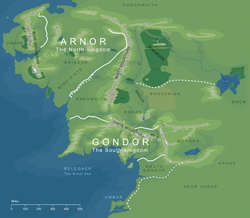
The Faithful also known as Elendili or Elf-friends referred to the minority faction of Númenóreans who remained friendly with the Elves and respectful and obedient to the Valar. They were also called the Faithful for their continued devotion and obedience to the Valar. Their most noted leader was Elendil, Lord of Andúnië, who later founded the kingdoms of Arnor and Gondor in Middle-earth.
History[]

Amandil was the eighteenth and last Lord of Andúnië in Númenor
The Faithful (Q. Elendili, A. Nimruzîrim, both terms meaning "Elf-friends") were those among the Númenóreans who remained loyal to the will of the Valar throughout the history of Númenor, and turned aside from the policies of the later Kings of

City/Port of Andúnië
Númenor and the King's Men. Being the opposing party, the King's Men composed of the majority of the people, especially in the later part of the Second Age, while the Faithful were a far smaller and increasingly oppressed group. The Faithful lived mostly on the west side of Númenor until Ar-Gimilzôr the twenty-third King commanded them to move eastwards near island, Romenna, where many of them had been banished by King Ar-Gimilzôr. Their main leaders or spokesmen
traditionally had been the Lords of Andúnië. After their last Lord, Amandil the last Lord of Andúnië heard this news, he knew that the Númenóreans would surely come to ruinous defeat in war against the Valar, and so he decided to make a preemptive voyage into the West to beg them for mercy and deliverance from Sauron. Before he left, he advised his son Elendil to furnish nine ships and anchor them off the east coast of Númenor and wait for what would happen next. After he sailed west, Amandil was never heard from again, but by taking his advice, Elendil and his sons survived the disastrous Downfall of Númenor that was the result of Ar-Pharazôn's war.
Arnor in the North[]

Gondorian Soldiers
Arnor was founded at the end of the Second Age (S.A. 3320) by Elendil, whose sons founded Gondor at the same time. The history of the two kingdoms is intertwined; both kingdoms are known as the Realms of the Dúnedain in exile. Before the foundation of Arnor there was already a sizable Númenórean population living in Eriador, a result of the slow emigration of Númenóreans which had started under Tar-Meneldur and Tar-Aldarion. The region was home to Middle Men of Edain stock, and the early colonists soon interbred with the indigenous population. Elendil and his people were aided by High King of the Noldor Gil-galad and his people, and his ships sailed up the Lune river. He established the city of Annúminas as his capital. Arnor was originally favored over the more southern regions (Gondor) because the Elves under Gil-galad lived near it across the river Lhûn.[1] However, in later days after the Númenóreans fell under Sauron's shadow they settled more to the south. This led to a situation where Elendil arrived in an area populated by people who, unlike his own Númenóreans, were mainly still friends with the Elves, and unlike Gondor to the south in Arnor much knowledge of the Elder Days was preserved.
Gondor in the South[]
Gondor was home to many Númenórean colonists, who either mingled with the indigenous Middle Men if they were friendly, or dispersed them into Ras Morthil, Dunland, and Drúadan Forest. The land on which Gondor was founded was more fertile than the more northerly areas of Middle-earth, and therefore it already had a fairly large population and settlements, including a well-established haven, Pelargir[3] founded by the Faithful Númenóreans in the year 2350 of the Second Age. The refugees from Númenor led by Isildur and Anárion were given a warm reception upon their arrival by those Númenórean colonists. Those north of the river Anduin accepted Elendil's claim to kingship over them, being a heir of the Faithful Lords of Andúnie.
Reunited Kingdom[]
Aragorn came forward to make the same claim. This time, the people of Gondor accepted a King, and the Two Kingdoms were reunited at last. Like his ancestor Elendil before him, Aragorn took up his rule from the North-kingdom, but he travelled throughout his wide lands. The Shire was an exception to this, and though it lay within the Reunited Kingdom, Aragorn made a law that Men should not enter it, a law that he observed himself. Though his seat was in the north, Minas Tirith and the South-kingdom remained important, to the extent that he travelled there at the end of his life, and his tomb was among the Houses of the Dead beneath Mount Mindolluin. After Aragorn's death, his son Eldarion took up the High Kingship, and the Reunited Kingdom endured for many years under the new King and his descendants.
Gondorian Soldiers[]
A term used in Middle-earth for the Men of Númenor and (especially) their descendants in Arnor and Gondor after the Downfall in II 3319.

The Men of Númenor in Middle-earth

House of Elendil and the descents Lord of Andúnië and the House of Elros






